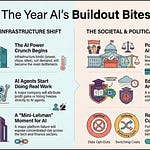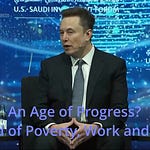A reminder for new readers. Each week, That Was The Week includes a collection of selected readings on critical issues in tech, startups, and venture capital. I chose the articles based on their interest to me. The selections often include viewpoints I can't entirely agree with. I include them if they provoke me to think. Click on the headline, contents link, or the ‘Read More’ link at the bottom of each piece to go to the original. I express my point of view in the editorial and the weekly video below.
Hat Tip to this week’s creators: @lizzadwoskin, @JStein_WaPo, @jacobbogage, @faizsays, @kwharrison13, @tedgioia, @ShapiroDoug, @2020science, @Benioff, @jsomers, @GoodwinMJ, @tomaspueyo, @othhughes, @mariogabriele, @RogerPielkeJr, @Dev__Digest, @StevenLevy, @ajkeen, @MagnaDing, @pcl_ctic, @Sherman1890
Contents
Government and Tech
Innovation and AI
Population and Growth
Data
Society
Venture Capital
Steven Levy - 20 years of Tech Coverage
Elon Musk’s xAI Game Studio
Breaking Up Google Would be a Big Mistake
News of the Week (now published separately)
Editorial
There is a bit of a change this week. Firstly, News of the Week has now moved to its own Substack post, which is linked in the contents. Feedback says many of you find it useful, while others find it too much to read. So, if you are in the first group, it is here.
Second, Video of the Week has gone. Any good video is included as either an essay or in the news. Andrew Keen’s KeenOn will replace it. Andrew has many weekly interviews, and we will highlight the best ones. Steven Levy this week.
Finally, I am putting sub-headings into Essays of the Week to make them better organized.
This week's top essay is by Elon Musk and Vivek Ramaswamy, outlining their plans for an efficient Government. I think the words efficient and government do not belong together. I am starting to believe that Musk and Ramaswamy will not make enough difference. Their manifesto focuses on some much-needed slashing of regulations and budgets using Presidential decrees. But is silent on modernizing the delivery of government services.
This is from their manifesto:
Our nation was founded on the basic idea that the people we elect run the government. That isn’t how America functions today. Most legal edicts aren’t laws enacted by Congress but “rules and regulations” promulgated by unelected bureaucrats—tens of thousands of them each year. Most government enforcement decisions and discretionary expenditures aren’t made by the democratically elected president or even his political appointees but by millions of unelected, unappointed civil servants within government agencies who view themselves as immune from firing thanks to civil-service protections.
The need to reduce unelected decision-making, especially regarding spending, is not a right-wing idea; it is common sense. I empathize with the sentiment. However, modernization is the best way to bring efficiency.
I suspect they both know that, but their manifesto does not mention it. Instead, they focus on deregulation (good) and procurement (good). But what about modernizing and revolutionizing service delivery using technology? Strangely, they are silent. I hope that is an error of omission and not a plan.
Government as a service to the people is a long-forgotten purpose. Musk and Ramaswamy should be judged by how well they deliver on that—spending less and delivering more to improve our experience of dealing with government.
I am not optimistic that they will do so based on the focus on regulations, bureaucracy, and procurement and the complete absence of any narrative around modernization.
What is the Government for? That is a question we all need a better answer to.
This week's essays covering AI mainly adopt a somewhat optimistic tone on what we can expect. Significantly, Mark Benioff weighs in on Agents, and I used Cursor to build a live ticker for private companies. Cursor acted as my programming agent. Benioff wrote in Time magazine (which he owns). How Digital Workers and Agents Will Lead to an Unlimited Age links AI to abundance. This is becoming a popular theme. When connected to the population-related stories about declining birth rates, it seems clear that more being produced by fewer humans is likely and possibly desirable, depending on how that abundance is distributed.
There is also alarming news on the regulatory front. The FTC is seeking to probe Microsoft and Uber, while the DoJ is seeking to break up Google. Post of the week points to Prof Herb Hovenkamp’s piece in the Times (New York) arguing that nobody would benefit from a Google breakup. It will not be long until Lina Khan vacates her position, but the FTC is going down fighting.
I will leave you to decide about the points made in the Politicization of the American University (and really, not just American universities). The essay is excellent and well-researched, and I mostly agree with it.
Happy Thanksgiving to you all. I am thankful you receive this newsletter in your inbox almost every week.
Essays of the Week
Elon Musk and Vivek Ramaswamy: The DOGE Plan to Reform Government
Author: Elon Musk and Vivek Ramaswamy | Published: 2024-11-28 | Reading Time: 6 min | Domain: wsj.com
Summary: In an opinion piece titled “Elon Musk and Vivek Ramaswamy: The DOGE Plan to Reform Government,” published on November 20, 2024, Elon Musk and Vivek Ramaswamy discuss their appointment by President-elect Donald Trump to co-head a newly formed Department of Government Efficiency (DOGE). They argue that the U.S. government has become overly bureaucratic, with unelected officials exerting significant power through regulations not passed by Congress, which they believe is anti-democratic and contrary to the Founders’ vision.
Their plan focuses on three main reforms:
1. Regulatory Rescissions: Utilizing recent Supreme Court rulings—West Virginia v. Environmental Protection Agency (2022) and Loper Bright v. Raimondo (2024)—they aim to identify and rescind federal regulations that exceed congressional authorization. They propose that President Trump can pause and review these regulations through executive action, thereby correcting what they see as previous executive overreach.
2. Administrative Reductions: DOGE intends to reduce the federal workforce by identifying the minimum number of employees required for agencies to perform their constitutionally mandated functions. They suggest that fewer regulations necessitate fewer employees and propose measures like relocating agencies outside Washington D.C. and requiring in-person work to encourage voluntary resignations.
3. Cost Savings: They plan to address unauthorized federal expenditures and inefficiencies in the procurement process. By auditing and potentially suspending payments, they aim to eliminate waste, fraud, and abuse, leading to significant savings for taxpayers.
Musk and Ramaswamy emphasize that their approach relies on executive actions based on existing laws rather than new legislation. They anticipate resistance from entrenched interests but believe that substantial government reform is achievable with a decisive electoral mandate and a conservative Supreme Court majority. Their ultimate goal is to deliver a leaner federal government by July 4, 2026, coinciding with the nation’s 250th anniversary, which they see as a fitting tribute to the Founders’ ideals.
Musk and Ramaswamy race to build a ‘DOGE’ team for war with Washington
Published: 2024-11-25 | Domain: washingtonpost.com
Summary: Elon Musk and Vivek Ramaswamy are working together to create a "Department of Government Efficiency" at the request of President-elect Donald Trump. They have been seeking advice from experts in Washington and Silicon Valley and conducting interviews to find staff for the project. This has caused a stir as it moves from mere internet trends to a potential real-world disruption. The billionaire leaders have been spending time in Washington and at Mar-a-Lago, meeting with experienced individuals in politics, law, and technology. This information was shared by five sources who wished to remain anonymous.
The Levers of Innovation
Author: Kyle Harrison | Source: investing1012dot0.substack.com | Published: 2024-11-23 | Reading Time: 16 min | Domain: investing1012dot0.substack.com
Summary: The text discusses the complexities of understanding and driving outcomes in modern society, using examples from a TV show and a book. It also mentions a question posed by Tyler Hogge to Marc Andreessen about the constraints preventing the growth of exceptional startups. The author reflects on the difficulty of unraveling and improving interconnected societal issues and shares their thoughts on the question.
Power Is Shifting Rapidly to Indie Creators
Author: Ted Gioia | Source: www.honest-broker.com | Published: 2024-11-25 | Domain: www.honest-broker.com
Summary: The creator economy in the US has grown significantly, with 27 million people working in this field, representing 14% of the working-age population. According to the Keller Advisory Group, 44% of these creators work full-time. This trend is also seen globally, with Citi reporting that 120 million people work in the creator economy. These creators are involved in various forms of media, such as video, writing, photography, audio journalism, music, and artisan crafts. While "influencer" is often used to describe these individuals, it is not an accurate representation as most of them are genuine creators, not just influencers. These creators are gaining influence and becoming a significant industry force.
Why Ben Affleck is Probably Wrong
Author: Doug Shapiro | Source: dougshapiro.substack.com | Published: 2024-11-26 | Reading Time: 16 min | Domain: dougshapiro.substack.com
Summary: The author discusses the recent comments made by actor Ben Affleck at the CNBC Delivering Alpha conference about the effect of AI on Hollywood. Affleck's comments have been widely discussed and praised for their realistic perspective on the potential impact of AI on the film industry. However, the author disagrees with Affleck's conclusion that AI will only be a sustaining innovation for Hollywood, arguing that it has the potential to be a disruptive force. The author also highlights the growing use of AI in animation and its potential to significantly lower costs. They caution against downplaying the potential effect of AI on Hollywood and point out that the industry is already facing competition from creator content. The author provides a link to the full discussion between Affleck and other industry professionals for
Artificial intelligence, agency, and the emergence of humans as AI amanuenses
Author: Andrew Maynard | Source: The Future of Being Human | Published: 2024-11-24 | Reading Time: 8 min | Domain: futureofbeinghuman.com
Summary: The use of AI in research and discovery has the potential to increase productivity but decrease researcher satisfaction. The relationship between humans and AI is shifting, with AIs potentially becoming the idea generators and humans becoming their amanuenses. This raises questions about the future of human-AI relationships and the potential for a symbiotic partnership.
How Digital Workers and Agents Will Lead to an Unlimited Age
Author: Marc Benioff | Published: 2024-11-25 | Reading Time: 7 min | Domain: time.com
Summary: The text discusses the recent advancements in artificial intelligence (AI) and how they are shaping the future. These developments are not just limited to language and creativity, but are now entering a new era of autonomous AI agents that can take actions on their own and augment human work. This is a revolution that will redefine how humans work, live, and connect with each other. These agents are not just limited to predictive and generative AI, but can perform tasks independently, make decisions, and even negotiate with other agents. This shift to intelligent digital labor is unlocking massive capacity and transforming industries by eliminating human limitations and geographical barriers. However, there are also concerns about trust, accountability, fairness, and sustainability that need to be addressed. These agents have the potential
Salesforce CEO Marc Benioff Has Thoughts on AI Agents, Automation, And The Future of Your Job
Author: Alex Kantrowitz | Source: Big Technology | Published: 2024-11-27 | Reading Time: 27 min | Domain: bigtechnology.com
Summary: Salesforce CEO Marc Benioff predicts that in the future, companies will use AI agents to act on our behalf in customer service and other tasks. He believes that his company's software, which provides customer data and company policies, will make this possible. This technology has the potential to increase productivity and efficiency in industries like healthcare, where there is a shortage of human labor. Benioff sees this as the next step in business software, and discusses this and other topics in a recent podcast interview.
A Revolution in How Robots Learn
Author: James Somers | Source: The New Yorker | Published: 2024-11-26 | Reading Time: 7 min | Domain: newyorker.com
Summary: of dexterity
A new father reflects on the early days of his son's life, noting his motor babbling and the rapid development of his hand movements. He ponders the physical nature of intelligence and the complexity of the human hand. The author also discusses the challenges of replicating human movements in robotics and the potential for certain professions to be "A.I.-proof."
Britain's fertility crisis -we need to get serious before it's too late
Author: Matt Goodwin | Source: Matt Goodwin | Published: 2024-11-26 | Reading Time: 6 min | Domain: mattgoodwin.org
Summary: Matt Goodwin's Substack has gained over 62,800 subscribers from 171 countries, with thousands of paying supporters. The supporters have access to exclusive benefits such as the full archive, weekly discussions with Matt, and the ability to leave comments. However, there are concerns about the declining fertility rate in Britain, which is well below the replacement rate. This is not just a problem in the UK, but in other countries as well. The author argues that relying on mass immigration to fill the population gap is not a sustainable solution, as immigrants also age and have declining fertility rates. Additionally, the influx of immigrants from different cultures is causing social and economic issues in the UK. The author suggests that instead of relying on mass immigration, there needs
The Moral Case for More People on Earth
Author: Tomas Pueyo | Source: Uncharted Territories | Published: 2024-11-28 | Reading Time: 3 min | Domain: unchartedterritories.tomaspueyo.com
Summary: The text discusses four points related to growing the population: the impact of fears of overpopulation on people not having children, the positive effects of having children on individuals, the ethical implications of promoting a society with more children, and the idea that having children may be selfish. The author also presents data on reasons for not having children and the desire for more children than people end up having. The text concludes by stating that having children brings joy and happiness and is not harmful to society.
Sleepwalking into Obsolescence
Published: 2024-11-28 | Reading Time: 6 min | Domain: count.co
Summary: Data teams are working harder than ever, implementing new initiatives and improving their work to help their businesses. However, despite their efforts, there is a lack of recognition for their impact on the company's success. A recent survey showed that there has been no change in the percentage of companies using data to drive innovation in the past four years. Additionally, there is a trend of analysts moving away from more business-focused roles and into more technical ones, and they are also being paid less than their technical colleagues. This is contributing to a "service trap" where data teams are stuck in a negative feedback loop, becoming "dashboard factories" and not being valued for their contributions to the company's goals. This lack of recognition and focus on efficiency over value is
Mullet Capitalists
Author: Mario Gabriele | Source: The Generalist | Published: 2024-11-26 | Reading Time: 7 min | Domain: thegeneralist.substack.com
Summary: The text discusses a trend in the venture capital world called "Mullet Capitalism," where firms have a traditional business in the front and a venture capital business in the back. This trend is seen as a potential rebundling of the VC product, as the industry faces the possibility of an "extinction event" that could eliminate over 50% of managers. It is too early to tell if Mullet Capitalism will outperform traditional emerging managers, but it is becoming a popular alternative model. The author also promotes their premium newsletter, which offers exclusive access to the strategies and wisdom of successful investors and founders. The text ends with a discussion of the Chicxulub crater, which was created by an asteroid collision 66 million years ago
Politicization of the American University
Author: Roger Pielke Jr. | Source: rogerpielkejr.substack.com | Published: 2024-11-25 | Reading Time: 7 min | Domain: rogerpielkejr.substack.com
Summary: 2024, with a significant decline in confidence, Democrats’ views have also shifted, with a smaller decrease in confidence.
The text discusses the author's departure from academia after 24 years and their desire to make sense of the changes they have seen in universities since starting graduate school in 1990. The author focuses on the politicization of American universities and the loss of public confidence, particularly among conservatives. They clarify that their perspective is based on the 146 most research-intensive universities in the US and that politicization is not the only issue facing universities. The author values universities and wants them to work for everyone. They then discuss trends in public perception of colleges and universities, citing a Pew Research Center poll from 2012 that showed high levels
How to use Cursor with ChatGPT or Claude.ai.
I used it for this SignalRank Ticker project: https://ticker.signalrank.ai/embed
Keen On of the Week
Startup of the Week
Elon Musk's New Venture into AI Game Studio
Source: AI Secret | Published: 2024-11-28 | Reading Time: 1 min | Domain: aisecret.us
Summary: Elon Musk, known for his innovative and disruptive ventures in electric vehicles, space exploration, and neural technology, has announced plans to establish an AI-driven game studio under his company, xAI. This is part of Musk's goal to revolutionize the gaming industry, which he believes has been hindered by corporate control and ideological biases. Musk's interest in gaming is well-known, and he has criticized the current state of the industry, claiming that the quality of games has declined due to the dominance of large corporations. In response, he plans to use AI technology to create more dynamic and immersive gaming experiences, with the goal of "making games great again." This move aligns with Musk's overall vision of pushing the boundaries of innovation and disrupting traditional
Post of the Week
Center for Technology, Innovation & Competition at the University of Pennsylvania Carey Law School




























